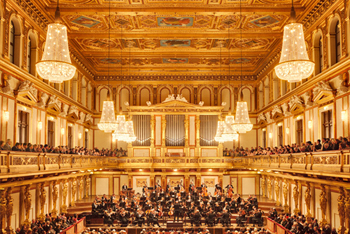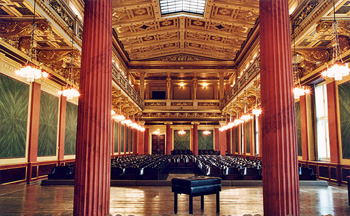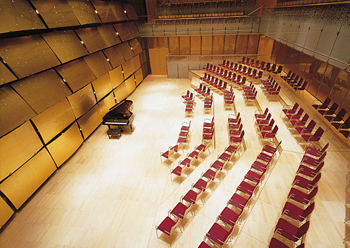Mozart: Requiem
January 2025 | ||||||
|---|---|---|---|---|---|---|
Mo | Tu | We | Th | Fr | Sa | Su |
Simplicity, Complexity, and Reduction
As a quantum physicist, Anton Zeilinger has experienced that nature is unimaginably complex, yet it can also appear quite simple, obvious, and clear when properly explored through scientific experiments. "An ideal in physics," says Anton Zeilinger, "is therefore simple, clear, reduced formulas from which an enormous amount of reality can be explained." But how is it possible to represent maximum complexity with extreme reduction? Anton Zeilinger is particularly interested in how the human brain processes complex situations or phenomena based on minimal information. "One can also reflect on how the human brain works through listening to music," says Anton Zeilinger— and this evening aims to demonstrate this in two ways. Firstly, with audio experiments that Anton Zeilinger will conduct live on stage with his scientific colleague Bernhard Jakoby and the audience. Secondly, with Mozart's Requiem. The concert will feature only the fragments composed by Mozart himself, compared with the full version added later. How does our brain react when it first hears the minimal fragment and then the complex full version? Anton Zeilinger and Bernhard Jakoby will explore such questions together and guide us through the evening. For example, they will discuss with conductor Stefan Gottfried whether Mozart might have heard more than he wrote down while composing. It will also be shown how the brain can construct sounds from minimal information.
Program and cast
Anton Zeilinger (Live Audio Experiments)
Bernhard Jacoby (Live Audio Experiments)
Concentus Musicus Wien
Singverein der Gesellschaft der Musikfreunde in Wien
Stefan Gottfried, Conductor
Soloists Ensemble
PROGRAM
WOLFGANG AMADEUS MOZART
Fragment and Complete Version of the Requiem in D minor, KV 626 (Excerpts)
Live Audio Experiments
Musikverein Golden Hall
This building is located on Dumbastraße/Bösendorferstraße behind the Hotel Imperial near the Ringstraße boulevard and the Wien River, between Bösendorferstraße and Karlsplatz. However, since Bösendorferstraße is a relatively small street, the building is better known as being between Karlsplatz and Kärntner Ring (part of Ringstraße loop). It was erected as the new concert hall run by the Gesellschaft der Musikfreunde, on a piece of land provided by Emperor Franz Joseph I of Austria in 1863. The plans were designed by Danish architect Theophil Hansen in the Neoclassical style of an ancient Greek temple, including a concert hall as well as a smaller chamber music hall. The building was inaugurated on 6 January, 1870. A major donor was Nikolaus Dumba whose name the Austrian government gave to one of the streets surrounding the Musikverein.
Great Hall - Golden Hall
 “As high as any expectations could be, they would still be exceeded by the first impression of the hall which displays an architectural beauty and a stylish splendour making it the only one of its kind.” This was the reaction of the press to the opening of the new Musikverein building and the first concert in the Großer Musikvereinssaal on 6 January 1870.
“As high as any expectations could be, they would still be exceeded by the first impression of the hall which displays an architectural beauty and a stylish splendour making it the only one of its kind.” This was the reaction of the press to the opening of the new Musikverein building and the first concert in the Großer Musikvereinssaal on 6 January 1870.
The impression must have been overwhelming – so overwhelming that Vienna’s leading critic, Eduard Hanslick, irritatingly brought up the question of whether this Großer Musikvereinssaal “was not too sparkling and magnificent for a concert hall”. “From all sides spring gold and colours.”
Brahms Hall
 "In order not to promise too much it can be said that it has been made into the most beautiful, most magnificent, perfect example of a chamber concert hall that any of us knows in the world.” This was the reaction of a Vienna daily newspaper in October 1993 as the Brahms-Saal was presented to the public after extensive renovation work.
"In order not to promise too much it can be said that it has been made into the most beautiful, most magnificent, perfect example of a chamber concert hall that any of us knows in the world.” This was the reaction of a Vienna daily newspaper in October 1993 as the Brahms-Saal was presented to the public after extensive renovation work.
The surprise was perfect. It was a completely new hall. In contrast to the Grosse Musikvereinssaal, the Brahms-Saal had changed its appearance quite considerably over the years. When and how it acquired that slightly melancholy duskiness that was known to music lovers before 1993 cannot be precisely documented.
Glass Hall
 As a venue for events from concerts to luxury banquets, the Glass Hall / Magna Auditorium is not only the largest of the Musikverein's 4 new halls but also the most flexible in terms of usage.
As a venue for events from concerts to luxury banquets, the Glass Hall / Magna Auditorium is not only the largest of the Musikverein's 4 new halls but also the most flexible in terms of usage.
Hub podiums enable the smooth transformation of the concert hall into a conference centre, the cinema into a ballroom, or the stage into a catwalk. State-of-the-art equipment for sound, lighting, video and widescreen digital projection provide the ideal conditions for half-scenic productions.
The Glass Hall / Magna Auditorium was designed by the Viennese architect Wilhelm Holzbauer. With a height of 8 metres, the hall (including the gallery) can play host to up to 380 visitors.
Performances: Mo 09 Sep 2024,
Performances: Tu 28 Jan 2025,
Performances: Su 20 Oct 2024,
Performances: Su 08 Sep 2024,
Performances: Su 11 May 2025, 11:00 - 13:00
Performances: We 18 Jun 2025,

 EN
EN DE
DE IT
IT FR
FR ES
ES RU
RU JP
JP RO
RO
 Seating plan
Seating plan 









